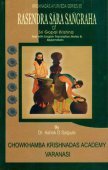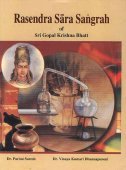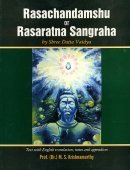Ashmari, Aśmari, Aśmarī: 11 definitions
Introduction:
Ashmari means something in Hinduism, Sanskrit, Marathi. If you want to know the exact meaning, history, etymology or English translation of this term then check out the descriptions on this page. Add your comment or reference to a book if you want to contribute to this summary article.
The Sanskrit terms Aśmari and Aśmarī can be transliterated into English as Asmari or Ashmari, using the IAST transliteration scheme (?).
In Hinduism
Ayurveda (science of life)
Kalpa (Formulas, Drug prescriptions and other Medicinal preparations)
Source: Ancient Science of Life: Yogaśataka of Pandita VararuciAśmari (अश्मरि) refers to “renal calculi” and is dealt with in the 10th century Yogaśataka written by Pandita Vararuci.—The Yogaśataka of Pandita Vararuci is an example of this category. This book attracts reader by its very easy language and formulations which can be easily prepared and have small number of herbs. It describes only those formulations which are the most common and can be used in majority conditions of diseases (viz., Aśmari).
Source: Shodhganga: Edition translation and critical study of yogasarasamgrahaAśmarī (अश्मरी) refers to “bladder stone” and is one of the various diseases mentioned in the 15th-century Yogasārasaṅgraha (Yogasara-saṅgraha) by Vāsudeva: an unpublished Keralite work representing an Ayurvedic compendium of medicinal recipes. The Yogasārasaṃgraha [mentioning aśmarī] deals with entire recipes in the route of administration, and thus deals with the knowledge of pharmacy (bhaiṣajya-kalpanā) which is a branch of pharmacology (dravyaguṇa).
Unclassified Ayurveda definitions
Source: archive.org: Vagbhata’s Ashtanga Hridaya Samhita (first 5 chapters)Aśmarī (अश्मरी) refers to “gravel”, mentioned in verse 4.5-6 of the Aṣṭāṅgahṛdayasaṃhitā (Sūtrasthāna) by Vāgbhaṭa.—Accordingly, “[...] racking in the limbs, gravel [viz., aśmarī], and pain in the bladder, the penis, and the groins (arise) from the stoppage of urine, and normally the above diseases (as well). The remedies for these (are) [...]”.

Āyurveda (आयुर्वेद, ayurveda) is a branch of Indian science dealing with medicine, herbalism, taxology, anatomy, surgery, alchemy and related topics. Traditional practice of Āyurveda in ancient India dates back to at least the first millenium BC. Literature is commonly written in Sanskrit using various poetic metres.
Languages of India and abroad
Marathi-English dictionary
Source: DDSA: The Molesworth Marathi and English Dictionaryaśmari (अश्मरि).—f S Strangury or dysury. 2 The stone or gravel.
Source: DDSA: The Aryabhusan school dictionary, Marathi-Englishaśmari (अश्मरि).—f Dysury. The stone or gravel.
Marathi is an Indo-European language having over 70 million native speakers people in (predominantly) Maharashtra India. Marathi, like many other Indo-Aryan languages, evolved from early forms of Prakrit, which itself is a subset of Sanskrit, one of the most ancient languages of the world.
Sanskrit dictionary
Source: DDSA: The practical Sanskrit-English dictionaryAśmarī (अश्मरी).—[aśmānaṃ rāti rā-ka gaurā° ṅīṣ] (In medicine) A disease called stone (in the bladder), gravel, strangury.
Source: Cologne Digital Sanskrit Dictionaries: Shabda-Sagara Sanskrit-English DictionaryAśmarī (अश्मरी).—f. (-rī) 1. Strangury. 2. Stone or gravel, (the disease.) E. aśmara stony, and ṅīp fem. aff.
Source: Cologne Digital Sanskrit Dictionaries: Monier-Williams Sanskrit-English DictionaryAśmarī (अश्मरी):—[from aśna] f. ([Pāṇini 4-2, 80]), (in [compound] sometimes aśmari, [Suśruta]) strangury, stone or gravel (the disease), [Suśruta etc.]
Source: Cologne Digital Sanskrit Dictionaries: Yates Sanskrit-English DictionaryAśmarī (अश्मरी):—(rī) 3. f. Strangury; the stone.
[Sanskrit to German]
Sanskrit, also spelled संस्कृतम् (saṃskṛtam), is an ancient language of India commonly seen as the grandmother of the Indo-European language family (even English!). Closely allied with Prakrit and Pali, Sanskrit is more exhaustive in both grammar and terms and has the most extensive collection of literature in the world, greatly surpassing its sister-languages Greek and Latin.
Kannada-English dictionary
Source: Alar: Kannada-English corpusAśmari (ಅಶ್ಮರಿ):—[noun] any abnormal stony mass or deposit formed in a kidney; calculus.
Kannada is a Dravidian language (as opposed to the Indo-European language family) mainly spoken in the southwestern region of India.
See also (Relevant definitions)
Starts with: Ashmaribhamjana, Ashmaribhedana, Ashmarighna, Ashmarihara, Ashmariharaka, Ashmarika, Ashmarikartana, Ashmarishastra.
Ends with: Kashmari, Khashmari, Shleshmashmari.
Full-text (+11): Ashmarighna, Ashmira, Ashmarihara, Ashmarika, Ashmaribhedana, Ashtamaharoga, Maharoga, Viratarvadi, Kulattha, Rasashastra, Ashcyotana, Netrakalpa, Shlaishmika, Varti, Ashmara, Anjana, Dadru, Kandu, Sidhma, Bidalaka.
Relevant text
Search found 11 books and stories containing Ashmari, Aśmari, Asmari, Aśmarī; (plurals include: Ashmaris, Aśmaris, Asmaris, Aśmarīs). You can also click to the full overview containing English textual excerpts. Below are direct links for the most relevant articles:
Sushruta Samhita, Volume 6: Uttara-tantra (by Kaviraj Kunja Lal Bhishagratna)
Chapter LIX - Symptoms and Treatment of the defects of Urine (Mutra-dosha) < [Canto III - Kaya-chikitsa-tantra (internal medicine)]
Chapter LV - Symptoms and Treatment of repression of natural urging (Udavarta) < [Canto III - Kaya-chikitsa-tantra (internal medicine)]
Chapter LVIII - Symptoms and Treatment of suppression of Urine (Mutra-ghata) < [Canto III - Kaya-chikitsa-tantra (internal medicine)]
Atharvaveda and Charaka Samhita (by Laxmi Maji)
Treatment of Aśmarī (stone disease) < [Chapter 3 - Diseases and Remedial measures (described in Atharvaveda)]
Mādhavanidāna (Āyurveda book) < [Chapter 1 - Introduction]
Hārīta (Āyurveda scholar) < [Chapter 1 - Introduction]
Jivanandana of Anandaraya Makhin (Study) (by G. D. Jayalakshmi)
Analysis of Bhayānaka-rasa < [Chapter 6 - Dramatic aspects of the Jīvanandana Nāṭaka]
The diseases of the Mulādhāra < [Chapter 4 - Āyurvedic principles in Jīvanandana Nāṭaka]
Act II (Summary) < [Chapter 3 - Summary of the Play Jīvānandana Nāṭaka]
Sushruta Samhita, volume 2: Nidanasthana (by Kaviraj Kunja Lal Bhishagratna)
History of Indian Medicine (and Ayurveda) (by Shree Gulabkunverba Ayurvedic Society)
Chapter 12 - Nosology and the Triumvirate < [Part 6 - The Science of the Triumvirate (Tridosha) Pathogenesis]
Sushruta Samhita, volume 4: Cikitsasthana (by Kaviraj Kunja Lal Bhishagratna)
Related products



